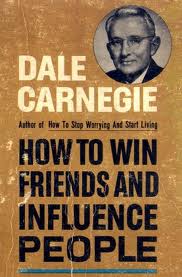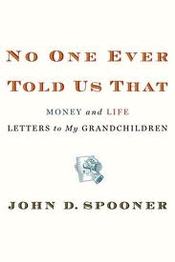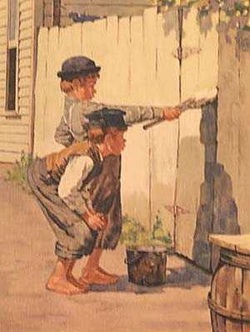 Rating: 5/5 I couldn’t have landed upon a better read. This book is awesome. Described simply, it’s about understanding the psychology of other people and therefore learning to treat them better with the intention of getting the best out of them. The book is so good that I had to add it to the recommended reading list in my newly published book, To Become an Investment Banker. The principles in this book can be applied to raising children, developing employees in one’s company, selling and any other interpersonal interactions. As usual, I will share some of the useful insights that were relayed. The book was also full of interesting examples and anecdotes but if you want these you will need to purchase it.
2 Comments
 I believe in the wisdom of older people regardless of wealth or educational background. (Most) old people are precious, you can't buy their life experiences, you can only hope to share in some of them. In this book, John D. Spooner shares a series of letters that he has written to his grandchildren to prepare them for "life" Both my grandfathers died before I was even two so I took to thinking of JD Spooner as a sort of surrogate grandfather, or papa as his grandchildren refer to him, as I read this book. I won't go into detail regarding all the examples he gave, however, I would like to share the following lessons I got from the book in the hopes that one or two might touch you. These are not exact quotes, they are just notes I took as I listened to the audiobook.
This book is a bible for the ups and downs of modern day life and it doesn't take long to read! The audio version is only five hours.  If you don't get any of the above, get the book, it will be one of the best "investments" you make all year. Some of my thoughts: I disagreed with his property investing strategy. He paid all cash when, I think, the genius of property investing in the developed world lies in leverage, using other people's money - but that's another blog on its own. When he covered bonds, JD Spooner didn't cover index-linked bonds, linkers. He simply said that it is equities that keep up with the cost of living, however, Linkers also keep up with inflation. Perhaps this was taking a step too far into high finance. In the section on staying in touch with his past, JD Spooner talked about a friend of his from high school that was a plumber in a town that he moved to. He called the guy to help him out with his plumbing. I wondered, how does he feel when he's in touch with people from his past that haven't achieved nearly as much as he has: he's a multimillionaire investment advisor and author of several bestsellers. In this book, "papa" talks about owning several million dollars of Citigroup stock before it tanked and that would only be one stock in an extensive portfolio, I expect. His friends must revere him, how does he relay to them that he's still the same old guy? This is the only query that remained outstanding by the time I finished the book.
 I have never read this book before (it wasn’t compulsory reading on the British curriculum) and I absolutely loved it. It’s not only an interesting story, it’s extremely well written and has fantastic characterization. Everyone on my commute officially thinks I am a mad woman because Tom consistently made me laugh with his ideas and amazing ability to sell stuff he was making up as he went along. I found his love for the limelight endearing. He wanted to be admired by everyone but most of all by little Becky Thatcher. Mark Twain's ‘cave’ debacle caught me completely unaware but I won’t say too much on this point because I don’t want to give the plot away. A lot of stories that I read nowadays are good plots but the writing isn’t particularly an art in itself. Indeed, I read so many such books that sometimes I forget what good writing is. I will share a few of my favorite lines: When Tom ‘tricked’ the boys into painting the garden wall for him: “He had discovered a great law of human action, without knowing it – namely, that in order to make a man or a boy covet a thing, it is only necessary to make the thing difficult to attain.” Personally, I felt like Tom taught me something here too; so cunning, so funny. On Sundays Tom wore “his “other clothes” – and so by that we know the size of his wardrobe.” When his affections transferred from Amy to Becky, “conscience-smitten too – he could not meet Amy Lawrence’s eye, he could not brook her loving gaze.” And then the poignant moment when Amy realizes that her ‘boyfriend’ likes somebody else: “Amy Lawrence was proud and glad, and she tried to make Tom see it in her face – but he wouldn’t look. She wondered; then she was just a grain troubled; next a dim suspicion came and went – came again; she watched; a furtive glance told her worlds – and then her heart broke, and she was jealous, and angry, and the tears came and she hated everybody. Tom most of all (she thought).” You will agree that such beautiful, well-crafted prose is nowadays rare. At the point of meeting Tom, Becky said she knew he was “Thomas Sawyer” but he corrected that swiftly: "“That’s the name they lick me by. I’m Tom when I’m good. You call me Tom, will you?”" I found Tom’s superstitions and ‘black magic’ very funny. “The truth was, that a superstition of his had failed, here, which he and all his comrades had always looked upon as infallible…Tom’s whole structure of faith was shaken to its foundations.” When Tom and his friend decided they weren’t loved: “As the two boys walked sorrowing along, they made a new compact to stand by each other and be brothers and never separate till death relieved them of their troubles. Then they began to lay their plans. Joe was for being a hermit, and living on crusts in a remote cave, and dying, some time, of cold and want and grief; but after listening to Tom, he conceded that there were some conspicuous advantages about a life of crime, and so he consented to be a pirate.” When Tom returned from ‘the island’” “What a hero Tom was become, now! He did not go skipping and prancing, but moved with a dignified swagger as became a pirate who felt that the public eye was on him.” Tom’s behavior was so beyond his age. Indeed, “at school the children made so much of him and Joe, and delivered such eloquent admiration from their eyes, that the two heroes were not long in becoming insufferably “stuck-up”." When Tom convinced Huck to join him in one of his crazy pursuits, “Huck was willing. Huck was always willing to take a hand in any enterprise that offered entertainment and required no capital, for he had a troublesome superabundance of that sort of time which is not money.” The above isn’t even a quarter of what I highlighted in this book. It seemed as though every other line was precious but I will leave you with this one innocent scene. When Huck his good friend suggested they take the guns that were in the ‘treasure cave’ Tom said: “No, Huck – leave them there. They’re just the tricks to have when we go to robbing. We’ll keep them there all the time, and we’ll hold our orgies there, too. It’s an awful snug place for orgies.” “What orgies?!” “I dono. But robbers always have orgies, and of course we’ve got to have them, too.” Aww. So innocent. If you haven’t read this, it’s my biggest recommendation in 2012 so far. It’s free on Amazon kindle.
|
By Heather Katsonga-WoodwardTime allowing, I love to read. If I read anything interesting, I will blog about it here. Categories
All
Archives
November 2015
|




 RSS Feed
RSS Feed






